
RUSSIAN JOURNAL OF HERPETOLOGY
Scope & Guideline
Exploring the Diversity of Reptiles and Amphibians
Introduction
Aims and Scopes
- Taxonomy and Systematics:
The journal emphasizes the classification, identification, and phylogenetic relationships among amphibians and reptiles, contributing to our understanding of biodiversity. - Ecology and Behavior:
Research articles often focus on the ecological roles, behavioral patterns, and habitat preferences of various herpetofaunal species, highlighting their interactions within ecosystems. - Conservation Biology:
The journal addresses the conservation status of herpetofauna, examining threats, population dynamics, and management strategies necessary for the preservation of species and their habitats. - Morphological and Physiological Studies:
Studies often explore anatomical, morphological, and physiological adaptations of reptiles and amphibians, providing insights into their evolutionary biology. - Environmental and Climate Interactions:
Research frequently investigates the impacts of environmental changes and climate variability on herpetofauna distributions and survival, contributing to ecological forecasting.
Trending and Emerging
- Climate Change Impact Assessments:
There is a notable increase in studies examining how climate change affects the distribution, behavior, and ecological niches of amphibians and reptiles, highlighting the urgent need to understand these impacts for conservation efforts. - Invasive Species and Their Effects:
Research on the introduction and impact of invasive species on native herpetofauna has gained traction, as understanding these dynamics is crucial for managing biodiversity. - Integrative Taxonomy:
The journal is seeing a rise in integrative taxonomic studies that combine molecular, morphological, and ecological data to resolve species identities and relationships, reflecting a modern approach to herpetology. - Conservation Genetics:
There is an increasing focus on conservation genetics, with studies aimed at understanding genetic diversity and population structure, which are essential for effective conservation strategies. - Urban Ecology of Herpetofauna:
Emerging research is exploring the effects of urbanization on amphibian and reptile populations, addressing how these species adapt to changing landscapes and human encroachment.
Declining or Waning
- Historical Distribution Studies:
Papers focusing on the historical distribution patterns of herpetofauna have become less common, possibly due to a growing emphasis on contemporary ecological and conservation issues. - Laboratory-based Behavioral Experiments:
Research relying heavily on controlled laboratory settings to study behavior is declining, with a noticeable shift towards field studies that provide insights into natural behaviors in real-world contexts. - Morphological Descriptions Without Ecological Context:
While morphological studies remain important, there is a waning interest in purely descriptive morphology without accompanying ecological or evolutionary implications, as researchers seek more integrative approaches.
Similar Journals
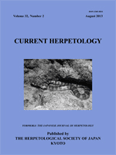
CURRENT HERPETOLOGY
Unveiling the mysteries of herpetofauna through rigorous science.CURRENT HERPETOLOGY is a leading journal dedicated to the study of reptiles and amphibians, published by the Herpetological Society of Japan in collaboration with the Graduate School of Science at Kyoto University. With its ISSN 1345-5834 and E-ISSN 1881-1019, this journal serves as a vital platform for sharing significant research findings in the field of herpetology. The journal has been continuously contributing to the scientific community since its inception in 2000, with a scope that embraces diverse topics including ecology, behavior, conservation, and physiology of herpetofauna. Recognized for its scholarly impact, CURRENT HERPETOLOGY holds a commendable position within the Q3 quartile in the Animal Science and Zoology category, ranking 350 out of 490 according to Scopus metrics. Although it is not currently an open-access journal, it caters to an audience comprising researchers, professionals, and students looking to deepen their understanding and engage with cutting-edge studies. Based in Japan, at the Department of Zoology in Kyoto, this journal is poised to foster advancements in herpetological research and promote global collaboration in this vital area of science.
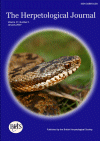
HERPETOLOGICAL JOURNAL
Illuminating the path for future herpetological research.Herpetological Journal, published by the British Herpetological Society, is a prominent platform dedicated to publishing high-quality research in the fields of herpetology, ecology, and conservation. With its ISSN 0268-0130, this journal has established a significant presence in the academic community, especially as it continues its publication journey from 1987 to 2024. Notably, the journal boasts a commendable impact factor, being ranked in the second quartile (Q2) for Animal Science and Zoology, and holds a third quartile (Q3) ranking in other essential categories including Ecological Modeling and Ecology, Evolution, Behavior and Systematics. The Herpetological Journal serves as an indispensable resource for researchers, professionals, and students, fostering the exchange of innovative ideas and insights crucial to the understanding of reptiles and amphibians. Although the journal currently does not offer open access, it remains a vital choice for those invested in the ongoing dialogue around herpetological studies and nature conservation.

Zoosystematics and Evolution
Unveiling the mysteries of species and their systems.Zoosystematics and Evolution is a premier peer-reviewed journal dedicated to the fields of animal science, zoology, and evolution, published by Pensoft Publishers. With a commendable Q1 ranking in multiple categories including Animal Science and Zoology, Ecology, Evolution, Behavior and Systematics, as well as Insect Science, this journal stands out as a vital resource for researchers and professionals engaged in the dynamic study of biodiversity and systematics. Since transitioning to Open Access in 2014, it has ensured that groundbreaking research is readily available to a global audience, thus fostering collaborative advancements and facilitating the dissemination of knowledge. The journal has a significant presence in both Scopus and various academic indices, enhancing its reputation and impact within the scientific community. Based in Bulgaria, at 12 Prof Georgi Zlatarski St, Sofia, the journal continues to thrive, contributing valuable insights that drive scientific inquiry and exploration in the ever-evolving realm of zoological research.
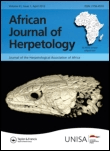
AFRICAN JOURNAL OF HERPETOLOGY
Illuminating the Path of Reptile and Amphibian ConservationThe AFRICAN JOURNAL OF HERPETOLOGY, published by TAYLOR & FRANCIS LTD, serves as a pivotal resource in the field of herpetology, encompassing the study of reptiles and amphibians. With an ISSN of 2156-4574 and an E-ISSN of 2153-3660, this journal offers a platform for researchers to disseminate their findings and advance knowledge in this dynamic area of biology. Recognized in 2023 with a category quartile ranking of Q2 in Animal Science and Zoology and Q3 in Ecology, Evolution, Behavior, and Systematics, the journal highlights impactful research to a global audience. By providing access to robust, peer-reviewed content, the journal contributes significantly to ongoing debates and discoveries, thus appealing to academics, professionals, and students alike. The journal's converged publication years, spanning from 1996 to 2000 and from 2002 to 2024, signify a long-standing commitment to the field, ensuring that emerging trends and critical issues in herpetology remain at the forefront. Engaging with this journal not only enhances your understanding of amphibian and reptile biology but also connects you to a community dedicated to the conservation and sustainable management of these vital species.

RAFFLES BULLETIN OF ZOOLOGY
Unveiling the Wonders of Wildlife ResearchRaffles Bulletin of Zoology, published by the National University of Singapore's Lee Kong Chian Natural History Museum, serves as a prestigious platform for the dissemination of cutting-edge research in Animal Science and Zoology, as well as Ecology, Evolution, Behavior and Systematics. With a current impact factor reflective of its Q2 category in both fields, this journal not only enhances its visibility in the academic community but also provides valuable insights into the complexities of biodiversity and conservation efforts. Covering a wide array of topics, Raffles Bulletin facilitates interdisciplinary collaboration and serves as an essential resource for researchers, professionals, and students alike. It is indexed in Scopus, ranking #233 out of 490 in Animal Science and Zoology and #406 out of 721 in Ecology, ensuring that the research published contributes significantly to the global discourse on wildlife and ecosystem management. Since its inception in 1996, this journal has bridged gaps in knowledge and continues to foster a deeper understanding of the living world.

CRUSTACEANA
Delving into the Evolution of Aquatic EcosystemsCRUSTACEANA, published by BRILL, stands as a pivotal resource in the field of Animal Science and Zoology as well as Aquatic Science, with a focus on advancing the understanding of crustacean biology, ecology, and evolution. With an ISSN of 0011-216X and an E-ISSN of 1568-5403, this journal has been curating significant research since its inception in 1960 and continues to contribute scholarly knowledge up to 2024. Although it operates without an Open Access option, CRUSTACEANA holds a commendable Q3 ranking in both the Animal Science and Aquatic Science categories for 2023. Furthermore, it consistently provides insightful articles that enrich the academic dialogue surrounding aquatic ecosystems, making it a valuable platform for researchers, professionals, and students alike.
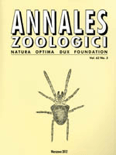
ANNALES ZOOLOGICI
Pioneering Discoveries in Zoological ResearchANNALES ZOOLOGICI is a distinguished academic journal published by the Museum & Institute of Zoology, Polish Academy of Sciences, based in Warsaw, Poland. With a long-standing tradition in zoological research, this journal has evolved to encompass a diverse range of studies in ecology, evolution, behavior, and systematics, aiming to foster a deeper understanding of animal biology and conservation. It holds a commendable Q2 classification in the 2023 Ecology, Evolution, Behavior and Systematics category, indicating its significant contribution to the field. Although ANNALES ZOOLOGICI is not an open-access publication, it remains accessible to a global audience of researchers, professionals, and students aiming to advance their knowledge and engage with cutting-edge zoological findings. As of 2024, this journal continues to be a vital resource for those eager to explore the complexities of animal life and contribute to ongoing discussions within this essential scientific discipline.
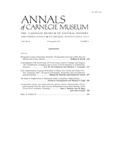
ANNALS OF CARNEGIE MUSEUM
Illuminating the Natural World: Rigorous Research for Informed UnderstandingANNALS OF CARNEGIE MUSEUM, published by the Carnegie Museum of Natural History in the United States, stands as a significant forum for scholarly research in the fields of Ecology, Evolution, Behavior, Systematics, and Geology. With an established history from 1990 to 2024, this journal caters to the scientific community by fostering the dissemination of high-quality, peer-reviewed articles that enhance our understanding of Earth's biological and geological processes. Notably recognized in the 2023 category quartiles, the journal ranks in Q2 for both Ecology and Geology, showcasing its importance and relevance in these disciplines. Although it currently does not offer open access options, the journal's rigorous editorial standards and impactful research, evidenced by its Scopus rankings, make it an indispensable resource for researchers, professionals, and students aiming to contribute to the advancing knowledge of natural history. The ISSN 0097-4463 and E-ISSN 1943-6300 facilitate easy access to its comprehensive archives, ensuring that vital insights into the natural world are readily available for ongoing scholarly exploration.
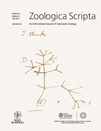
ZOOLOGICA SCRIPTA
Elevating the discourse in animal science and systematics.Zoologica Scripta, published by Wiley, stands as a distinguished journal within the fields of Animal Science and Zoology, Ecology, Evolution, Behavior and Systematics, Genetics, and Molecular Biology. With its inception dating back to 1971 and a convergence year extending to 2024, this journal consistently provides a platform for high-quality research, earning a Q1 ranking in two key categories and solid performance in additional fields, as evidenced by its significant Scopus rankings and impressive percentiles. Notably, it ranks 36 out of 490 journals in Animal Science and Zoology, placing it in the 92nd percentile. While Zoologica Scripta operates under a traditional access model, its rigorous peer-review process ensures that only the most impactful studies make their way into its pages. With a focus on advancing our understanding of biodiversity and evolutionary processes, this journal is indispensable for researchers, professionals, and students committed to the ongoing exploration of animal sciences and ecological studies.
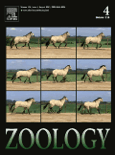
ZOOLOGY
Connecting scholars to elevate zoological research.ZOOLOGY, an esteemed journal published by Elsevier GmbH, stands at the forefront of research in the Animal Science and Zoology fields. With a notable impact factor and recognized as a Q1 category journal in its discipline, ZOOLOGY is highly regarded among researchers, ranking #98 out of 490 in Scopus rankings. Founded in 1994 and continuing through to 2024, the journal aims to publish cutting-edge, peer-reviewed articles that contribute significantly to the understanding of zoological sciences. Based in Munich, Germany, ZOOLOGY provides both subscription and open access options, ensuring that influential research reaches a wider audience. It serves as an essential platform for disseminating innovative findings, connecting scholars globally, and fostering interdisciplinary collaboration to advance zoological knowledge.